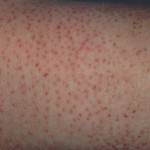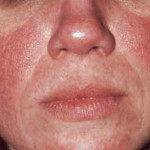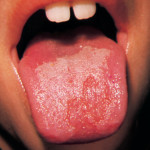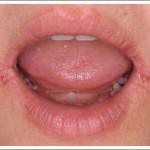Nutritional Deficiencies Linked to Skin Health


The skin is our largest organ. That’s right, it’s an organ. Just because it’s on the outside of the body makes it no less a vital organ. But, because it’s so visible, we have a tendency to treat it topically and superficially, which creates a great disservice to your skin, along with the rest of your body.
What’s Wrong With Treating the Skin Topically?
Let’s look at how our medical system typically treats a skin condition, such as a rash or eczema. If you go to a dermatologist (skin doctor) with a rash, you’ll likely come home with a topical steroid crème. This is the wrong approach for these reasons:
- Putting a steroid on a rash is like taking a pain reliever for pain. They are just temporary band-aids. And when the symptom returns, you realize that you did not get to the root cause of the problem.
- What’s worse, in the case of a steroid, is that using it is not only a temporary measure, but it actually weakens and damages the very system that you need to strengthen with any skin condition—the digestive tract.
- The health of the skin reflects the health of the GI tract. If you have any skin issues it’s almost guaranteed that you need some assistance improving the health of your digestive tract. Steroids weaken the digestive system, the immune system, and create a leaky gut, the last thing you need.
Root cause medicine tells us that getting to the underlying root cause of WHY a symptom appears is the only chance we have of restoring true health. So let’s take a look at your skin, hair, mouth, and tongue and get an idea of what they reveal about your health.
What is Your Skin Telling You?
Do you have dry, scaly skin? This is sometimes called dermatitis or seborrhea. There is a type of seborrhea where the nose and face meet called nasolabial seborrhea—it appears red and flaky in the fold.

Acne on the face, back, or chest can be caused by food sensitivities in addition to a deficiency of zinc, vitamin A, selenium, and/or essential fatty acids (omega 3s). Brown patchy pigmentation of the cheeks sometimes called a “moon face” is due to insufficient protein or calories.

What Does Your Tongue Tell You?
Do you know when the doctor asks you to stick out your tongue? He or she isn’t just looking at your tonsils, he’s also assessing for potential nutritional deficiencies depending on the appearance of the tongue and gums.

What Do Your Gums Reveal?
Gum and periodontal problems (periodontitis) tend to see with deficiencies of CoQ10, folic acid, vitamin C, B2, and vitamin D deficiencies. If the gingiva or gums are tender and bleed easily when flossing, or your dentist has said you have gingivitis, one nutrient often found lacking is niacin.
Your Mouth and Lips Will Also Tell You of Nutritional Deficiencies

What Does Your Hair Reveal?
Dry hair or dandruff can be found with essential fatty acid deficiencies. Loss of hair—or dry, brittle hair—can also be the result of thyroid imbalance or other hormonal issues.
How To Eat Better for Healthier Skin and Hair
You probably noticed a theme of nutrients that kept showing up despite the long list of different conditions. Let’s look at where you can find these vitamins, minerals, and essential fatty acids in the diet so that you can enjoy beautiful, healthy skin and hair.
Zinc
Zinc is a very important mineral that we discussed in the earlier blog on nails. Much as it plays a part in nail health, so too does it find its place in the health of skin, tongue, and mouth health. Zinc can be found in meat and poultry while non-animal sources include:
- Pumpkin seeds
- Sesame seeds
- Bran
- Adzuki beans
What is the recommended daily allowance for zinc? For men—11 mg of elemental zinc. For women—about 8 mg. Some individuals need more zinc than the average person. These include pregnant and lactating women plus vegetarians/vegans. As a clinical nutritionist, I find many patients deficient in zinc. We have a simple test here in the office where you can drink some liquid zinc and by its taste alone, you can get an idea of your zinc status. Vegetarians commonly eat a lot of legumes, seeds, nuts, beans, and whole grains, which contain phytates. These bind zinc (and iron) and inhibit its absorption. Therefore vegetarians and vegans may require as much as 50% more of the recommended daily allowance for zinc than non-vegetarians. Cooking or soaking these foods reduces the phytic acid content, so that’s something to keep in mind along with having your zinc status tested to know for sure.
Pregnant women are at an increased risk of zinc insufficiency due to high fetal requirements for zinc. Building a baby body from scratch requires a lot of good nutrients! Breastfeeding can also deplete zinc. Lactating women should aim for about 12 mg of elemental zinc each day.
Men should know that the human prostate accumulates the highest level of zinc of any soft tissue in the body. Cancerous prostates appear to have less zinc than do normal prostates. Additionally, a severe zinc deficiency can lower total testosterone and lead to impotence. Remember though, if a little is good, more is not better. Overdosing on zinc isn’t a good idea either, so try to keep intake under the upper limit of 40 mg of elemental zinc per day. When discussing zinc dosages, it can be confusing when you see how much zinc is on the label of your favorite multiple. As an example, our Optimum Daily Allowance has 50 mg of zinc picolinate. That’s not 50 mg of elemental zinc which is what we are referring to above when we cite the daily allowance at 11 mg and 8 mg respectively. In a supplement, they bind to zinc to an acid such as picolinic acid, acetic acid, etc to assist the body in absorbing the mineral. Therefore when you see zinc picolinate or zinc gluconate at a dose of about 45-50 mg, you’re likely looking at about 15 mg of elemental zinc, the rest of the weight comes from the acid.
Here at Root Cause Medical Clinic, our zinc lozenge provides 15 mg of elemental zinc that when bound to zinc aspartate totals 46 mg. Don’t think you’re getting too much of the elemental mineral when you see the total milligrams of the mineral and acid combined. The addition of the acid ensures (providing you have a healthy gut) optimal absorption of the mineral.
Vitamin A
You likely noticed that vitamin A was mentioned quite a bit in skin conditions. Where can you find A in your diet? You might remember as a child being told to eat carrots for better eyesight in the dark? It’s true, vitamin A is known to help vision. And it is found in orange veggies.
- It turns out the highest vitamin A can be found in sweet potatoes, followed by carrots, dark green leafy vegetables, and squash.
What does vitamin A assist with besides healthy skin?
- It helps with the strength of your immune system, strong bones, and aiding the lining of organs and blood vessels to keep them strong and intact.
The type of vitamin A found in fruits and vegetables is an A precursor, the most common of which is beta-carotene. Precursors can be transformed into active vitamin A in the body. Beta-carotene is the safest form of vitamin A to take because it’s almost impossible to get too much. The body simply makes it into the active A as needed. The active form of vitamin A is called retinol, also known as preformed vitamin A. Too much retinol has been linked to increased hip fracture and lessening the benefits of vitamin D. When buying multiple vitamins, it should have the majority of vitamin A in the form of beta-carotene.
Our Optimum Daily Allowance aligns with that recommendation – over 70% of the A provided is in the form of beta-carotene. It’s of interest to note that ‘natural’ vitamin A in the form of safe beta-carotene is found in fruits and vegetables. It’s the ‘fortified’ vitamin A found in breakfast cereals, dairy products, and other mostly poor food choices that have added retinol. There’s another good reason to stick with the natural ‘nature-made’ vs. ‘machine-made’ prepackaged foods.
Essential Fatty Acids
These are fatty acids that must be ingested because the body requires them for good health but it cannot manufacture them itself. Those that we are most deficient in are found in such foods as Chia seeds, walnuts, flax seeds, fish oil, omega-3 enriched eggs, and hemp
The two main fatty acids are omega 3s and 6s. While the benefits of omega 3s are discussed often, a balance of 1:1 or 1:2, omega 3: omega 6 is considered healthy. Unfortunately, most Americans are skewed at a ratio of 1:20+ and that is why you hear more about the benefits of omega 3s. Most Americans don’t have nearly enough of them in their diet. The essential fatty acids as whole help with much more than skin health. Some of their benefits are:
- Cellular development and the formation of healthy cell membranes
- They block tumor formation in animals
- They block the growth of human breast cancer cells.
- They assist in the development and function of the brain and nervous system,
- They help regulate proper thyroid and adrenal activity.
- They play a role in thinning your blood, which can prevent blood clots that lead to heart attacks and stroke
- They have natural anti-inflammatory qualities making them truly a preventer of disease
- They regulate blood pressure, immune responses, and liver function
- And they break down cholesterol.
B Vitamins
You likely noticed that many skin conditions mentioned above were associated with B vitamin deficiencies. Sources of B vitamins are many and they include whole grains, lentils, dark green leafy vegetables, almonds, pecans, and animal products. This group of 8 vitamins is essential for:
- The breakdown of carbohydrates into glucose, which provides energy for the body
- The breakdown of fats and proteins, which aids the functioning of the nervous system
- Muscle tone in the stomach and intestinal tract
- Skin, eyes, mouth, and hair health
- Liver health
If Bs are so abundant, how can we become deficient in them? B vitamins are water-soluble, not stored in the body (excluding folic acid and B12 that are stored in the liver), and delicate. They are easily destroyed, particularly by alcohol and cooking. Food processing also reduces the number of B vitamins in foods, making white flours, bread, and rice less nutritious than their wholegrain counterparts.
It is felt that if a person has a poor diet, even for just a few months, he or she may end up with a B vitamin deficiency. This is true for B vitamins and for general nutrition: Eating healthy must become a daily, every meal experience. Taking weekends off from eating well or trying to eat one healthy meal per day just isn’t going to make the grade in our current, less than the healthy, environment. It’s also important to know that stress ‘eats up’ B vitamins. So if you’re under more stress you can consider taking a little extra of your Bs in supplement form to counteract the stressors in the environment. You should discuss this with your doctor to tailor the best approach to your situation.
The Final Piece in the Puzzle
Even if you’re trying to eat well, your absorption and ultimate benefit derived from the food you eat and the supplements you take fully depends on your body’s ability to digest and absorb those substances. The sad fact is that too many Americans have unhealthy digestive tracts that not only can reflect themselves in poor skin health, but they compromise your very ability to glean good nutrition from what you eat and supplement.
Here at Root Cause Medical Clinic, one of our specialties is restoring digestive health. Despite the sheer square footage of the digestive tract (it’s the surface area of a tennis court!), healing it is not difficult. It does require diet, lifestyle, and nutritional changes, but nothing that’s difficult, scary, or dangerous – meaning typically no drugs or surgery. Therefore if you are truly trying to eat well but find that you continue to have skin issues, there IS a reason. It may be a combination of digestive, liver, and/or hormonal issues. But do know there is a reason and as a root cause medicine clinic, that’s our specialty.
I hope this information was helpful. Hopefully, it resonated with you on two levels: 1) If you have a skin issue it means that there is likely a problem with your digestive tract. 2) The same deficiencies or dietary imbalances creating the skin problem could also be contributing to other health problems you’re experiencing.
For even more information, watch my videos on YouTube: “Nutritionally Deficient? Look to Your Skin and Hair” (14:30) “Want to Know Your Nutritional Status? It’s in Your Nails!” (10:26).
Do you need help with your health?
We have the diagnostic and testing tools, the clinical experience, and a different medical approach to discovering the root cause of why you have the symptoms that are bothering you. As long as you are ready to make some dietary and lifestyle changes, we can help you. We will "hold your hand" through the changes, step by step, to make each step an easy one. We are located in Clearwater, FL, at 1000 S Ft Harrison, at the corner of Ft. Harrison Ave. and Magnolia St. There is plenty of parking space directly accessible from Ft Harrison. If it is not convenient for you to come to Root Cause Medical Clinic, we offer telehealth/telemedicine consultations to residents of certain states. Call us for details.
Contact us for a Consultation – Call 727-335-0400

Dr. Vikki Petersen DC. CCN
Founder of Root Cause Medical Clinic
Certified Functional Medicine Practitioner
Dr Vikki Petersen is a public speaker, author of two books, several eBooks and creates cutting edge content for her YouTube community. Dr Vikki is committed to bringing Root Cause Medicine and its unique approach to restoring health naturally to the world.
Ask a Doctor
Have a health concern you'd like to speak with a doctor about? Or just want clarity on a subject? Ask Us!


